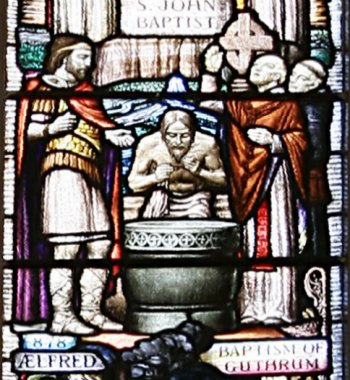
The second panel of the right light depicts the baptism of Guthrum. The date is 878, and King Alfred of Wessex is standing on the left. In the centre, the Danish leader Guthrum is bending over the font, being baptized by the priest on the right, who is attended by a tonsured monk. Maynard preached on this scene in a sermon dated October 24, 1948.
The incident depicted here took place fairly early in the reign of King Alfred. The kingdom of Wessex in the west of England had been under attack from the Danish marauders for many years. Alfred became king in 871, at the age of 23, when his brother was killed in these struggles. He continued to resist the Danish invaders and, after many setbacks, was finally able to win a decisive battle in 878. As part of the peace settlement at Wedmore in Somerset, the Danish leader Guthrum of East Anglia was baptized, along with several of his followers, and bound to a solemn peace. With minor exceptions, this peace lasted for many years, and Alfred was able to consolidate the kingdom of the West Saxons and establish what was, by all accounts, an elightened and forward-looking rule until his death in 899.
Although Alfred was never king of a united England, his influence was such that many still look on him as the archetype of English kingship, and he is honoured in the Anglican tradition as a Hero of the Christian Church, with the Feast Day of October 26 in the revised Prayer Book of 1928.